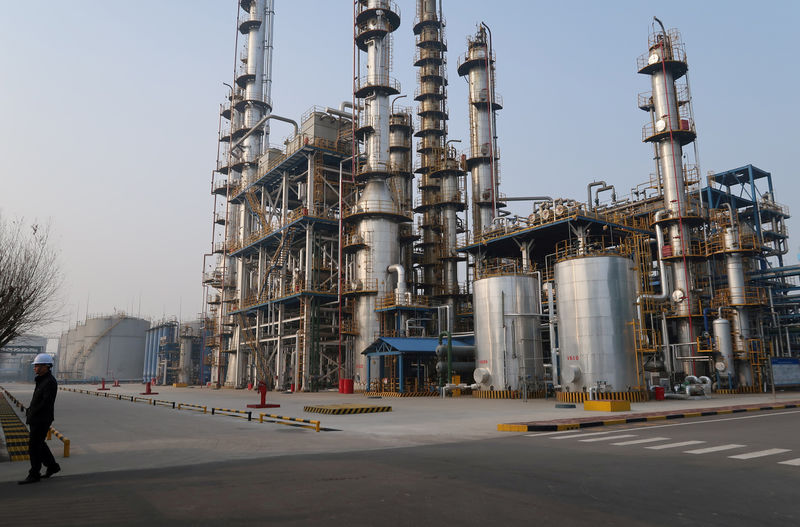By Meng Meng and Chen Aizhu
BEIJING (Reuters) - China's independent oil refiners are suffering a drastic change of fortune as new tax rules, shrinking diesel demand and higher crude prices threaten their nearly three-year profit bonanza.
Industry executives and analysts said nearly 40 private refiners, often called "teapots" - which account for a fifth of China's almost 10 million barrels per day (bpd) in crude oil imports - are losing money and market share. Several have shut for maintenance to cut exposure to the market, and some teapots may have to shut for good if the conditions continue.
"The gains in retail prices at pumps in recent weeks have been completely wiped out by higher costs of crude and a hefty consumption tax," said Gao Jian, crude oil analyst with China Sublime Information Group.
"We expect much weaker margins in June and July as more orders booked at peak crude prices arrive," Gao said.
Asian refining margins have thinned as crude prices (LCOc1) surged amid output cuts led by the Organization of the Petroleum Exporting Countries (OPEC), Venezuela supply disruptions and looming U.S. sanctions against major exporter Iran.
But China's independents have also been hit hard by new tax rules that cut even further into their profit. Last month, teapots lost 300 yuan ($46.80) per ton of crude oil processed, data provided by Zibo Longzong Information Group showed.
That is a stunning reversal from a profit of 900 yuan a ton in early 2016.
Beijing enacted new rules in March to enforce collection of a $38 per barrel gasoline consumption tax and a $29 per barrel tax on diesel, a response to the alleged use of illicit fuel invoices by many of the teapots to evade the taxes.
The teapots' plight throws into sharp relief the performances of their state rivals, including top refiners PetroChina (SS:601857) and Sinopec (SS:600028), where 2018 profits so far are running at their best in two or more years.
State refiners have to pay the consumption tax as well, but their massive local marketing networks and control of China's fuel exports help to offset the domestic market pressures.
To view a graphic on China diesel & gasoline exports, click: https://reut.rs/2yc8UF2
TROUBLES FOR TEAPOTS
The teapots' influence and size has grown significantly since they began winning crude import licenses in 2015. Last year was a blockbuster, as they churned out record earnings, expanded into petrochemicals and beefed up trading teams.
This year, in contrast, has been one of deepening trouble, with several teapots shutting for maintenance to avoid losses. Jincheng Petrochemical Co launched a month of maintenance in May at its 5.9 million-tonne-per-year (118,000 bpd) refinery, after losing money on rising crude prices since late March, said a marketing manager with the refinery, declining to be named due to company policy.
At an oil trade show late last month in Dongying in Shandong province, home to many teapots, sales managers from more than 20 independents were jostling about trying to sell fuel to major trading firms, state refiners and other teapots.
Several, including Wudi Xinyue Fuel and Chemicals Co and Fuhai Group, plan to keep product inventories low, fearing that domestic oversupply could further dampen fuel prices, according to interviews with sales managers at the trade show.
"We barely keep any inventory for diesel and gasoline. There are more uncertainties in the market with more refineries coming online this year," said an executive with a teapot in Dongying.
Others like the Haike Group were retreating from the northeastern provinces of Heilongjiang, Jilin and Liaoning, where last year's strong sales were not repeating. Haike is instead focusing on areas around Shandong in the east, an executive with the group said.
To view a graphic on China's monthly gasoline and diesel demand, click: https://reut.rs/2JMKljc
STRUGGLE AGAINST STATE MAJORS
State refiners have access to a surging export market, and dominate China's retail fuel market, making it easier for them to pass higher crude costs and tax burdens on to consumers.
Teapots, however, have to offer more competitive prices and their margins are much thinner.
Several independent refiners, including Shandong Zhonghai Fine Chemical Group, Guangrao Kelida Petrochemicals Technology and ChemChina's Huaxing Petrochemical, said PetroChina and Sinopec were paying for products only at steep discounts to market values and were also reducing purchases.
A manager at Kelida, a major supplier of asphalt to PetroChina, said his firm was now struggling to break even compared with a 400 yuan a tonne profit last year.
"Wholesale prices offered by PetroChina are so cheap that we will be running at a loss," the manager said, declining to be named because he is not authorized to speak to media.
Zhonghai Fine Chemical, with 2.3 million tonnes a year in crude processing capacity, said Sinopec was ordering far less fuel than last year.
"Sinopec has halted buying diesel from us this year. Last year the volume was at least 10,000 tonnes each month," a manager said, also declining to be named.
Teapot managers said they are urging the government to give them leeway in paying the consumption taxes.
"We urged the government to reconsider the tax policies. Otherwise some of us are going to fail," said a manager with ChemChina Huaxing refinery.

Sinopec declined to comment on its purchase plans, and PetroChina did not respond to inquiries.